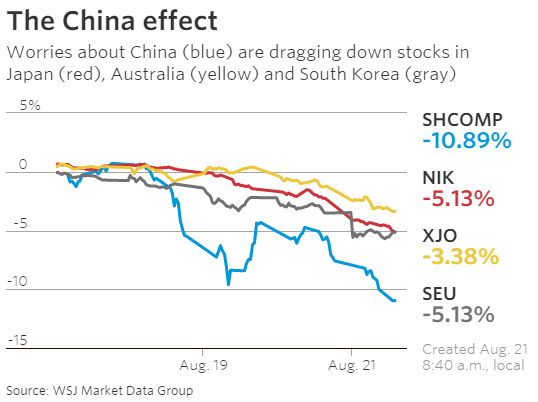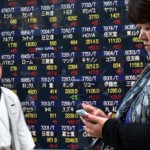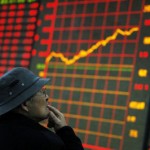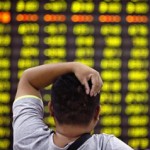China Shares Hit New Low Since Depth of Selloff
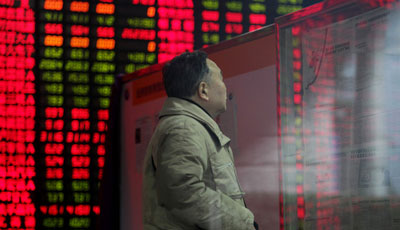
Early gauge of China’s factory activity falls to multiyear low
China’s stock market set a new low since the depths of the summer selloff that wiped out roughly a third of its value, despite massive intervention from Beijing.
The Shanghai Composite Index fell as much as 4.7% to 3493.9, breaching its July 8 low of 3507.19.
That puts the index 32% from its June 12 peak, which had been its highest in seven-plus years.
The selling in June and July prompted the government to step in with a range of rescue measures, from a stabilization fund that has spent tens of billions of dollars to prop up the market, to the banning of selling of shares by state-owned firms.
The Shanghai Composite began to stabilize and some analysts even expected that Beijing would try to keep it within the 3500 to 4000 level range. But worries about a slowing Chinese economy and the pressures that has had on the Chinese yuan have spurred a fresh bout of volatility in the market.
The smaller Shenzhen Composite Index was down 4.6% at 2056.77. It remains up 9% from its July 8 low of 1884.46.
China’s fitful stocks and currency devaluation has unsettled markets across Asia, the U.S. and Europe, pressured commodities and sent investors to safer assets like gold and U.S. Treasury bonds.
The latest signal of China’s economic health, an early gauge of factory activity, fell to its lowest level in more than six years on Friday. The Caixin preliminary manufacturing purchasing managers index for August fell to 47.1 compared with a final reading of 47.8 in July.
“China’s economic slowdown may put downward pressure on the global economy” and weigh on stocks, said Mitsushige Akino, chief fund manager at Ichiyoshi Investment Management.
Japan’s Nikkei Stock Average fell to its lowest level in six weeks, currently down 2.6%, and Australia’s S&P ASX 200 was off 2.1%.
Worries about China’s decision last week to devalue its yuan has intensified investor concerns that weakness in the world’s second-largest economy will crimp global growth, particularly among China’s northern Asian competitors in the exports market.
Benchmarks in Taiwan and Hong Kong are flirting with bear-market territory, defined as a 20% drop from a recent peak. Hong Kong shares are headed for the worst weekly performance since 2011.
On Friday, the Hang Seng Index was off 2.4%, its lowest since May 2014 and South Korea’s Kospi was down 1.9%, to its lowest level since late 2013. Taiwan’s Taiex was down 2.5%.
Currencies in countries that compete with or send exports to China continue to tumble. Malaysia’s ringgit and Indonesia’s rupiah sank to fresh 17-year lows. The ringgit was down as much as 1.1% to 4.1830 against the U.S. dollar and the rupiah was last down 0.5% at 13,920 per dollar.
The Australian dollar is down 0.4% at $0.7305 and South Korea’s won is down 0.8% at 1,193 per dollar.
Global worries are now increasingly complicating the U.S.’s plans to raise interest rates later this year. Some Fed officials pointed to slowing growth in China’s once-booming economy as a reason for caution.
On Friday, the People’s Bank of China guided the onshore Chinese yuan sharply stronger, setting the midpoint for its currency at 6.3864 against the U.S. dollar compared with 6.3915 a day earlier. The currency can trade 2% above or below that level. The yuan is currently trading at 6.3983.
Global jitters are sending investors to assets perceived to be safer. Gold notched its best day in nearly four months Thursday on anticipation that the Federal Reserve will stand pat on interest rates and amid volatile currency moves. Gold is currently trading at $1,163.30, up 0.9% in Asia trade.
The Japanese yen strengthened to 122.86 per U.S. dollar compared with 123.45 at the close of Asian trade Thursday.
Investors also are heading to Asian government bonds, sending yields lower. Yields on benchmark 10-year Australian government bonds fell 0.08 percentage points to 2.59%. China’s 10-year government bond yields fell 0.09 percentage points to 3.52% and Japan’s fell slightly to 0.35%. Yields fall when bond prices rise.
Asia’s corporate bond prices, meanwhile, have weakened, with yields on investment-grade corporate bonds up five to 10 basis points.
“The market is a bit nervous…but I don’t see a collapse here. Compared with other asset classes, Asia credit is holding up pretty well,” said a senior trader in Hong Kong.
China’s cooling factory activity is likely to heap more pressure on prices of commodities, which have plumbed new lows in recent weeks, particularly oil and industrial metals like copper and aluminum.
Brent crude oil futures are down 1.3% in Asia to $46.03 a barrel.
Source: WSJ – China Shares Hit New Low Since Depth of Selloff









